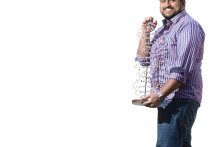PhD candidate from the NanoElectronics group Dilu G. Mathew, who originally comes from India, first moved to England, where he acquired a Master’s degree in engineering and worked for several years. However, he soon realized that wasn’t his true calling.
He says: ‘I knew I wanted to do something to save lives; develop something that could be a crucial diagnostic device. For me, bionanotechnology was the way to do that, so I pursued with my studies and research at the UT.’
Nanogap device
‘If you detect cancer at an early stage, you can save the person’s life, but today most cancers are diagnosed too late which reduces the survival rate. I’d like to change that. We have developed nanogap devices using easy microfabrication techniques at MESA+ cleanroom. These nanogaps can be used to detect certain cancer modified DNA – also called hypermethylated DNA - and therefore determine if the person has cancer’, explains Mathew.
Noninvasive test
‘We are aiming to develop a device that can detect cancer from the patient’s urine. Therefore we could avoid painful invasive tests and the testing would become very cheap and fast and could be done directly in the doctor’s office, without involving a big lab to analyze the results’, Mathew lists all the possible advantages of the sensor he is working on.
‘For example, 150 000 cystoscopy tests are being carried out every year in the Netherlands for bladder cancer screening and each one of those costs about 1000 Euros. We are aiming to create devices with the cost of under 50 Euros. Then more people can get tested, thus we can save a lot of lives and money’, adds Mathew. The research is currently focused on detecting bladder cancer, cervical cancer and prostate cancer, but the hope is to use such devices for detecting also other types of cancer and diseases.
Researcher-entrepreneur
Dilu G. Mathew is not only a dedicated researcher, but he might also contribute to the list of UT spin-offs. ‘After I’m finished with my PhD research, I’d like to start a company that produces such devices, able to detect cancer early on’, he says. It’s too soon to tell if this company will succeed, but Mathew’s research project surely has the potential to change many people’s lives.







